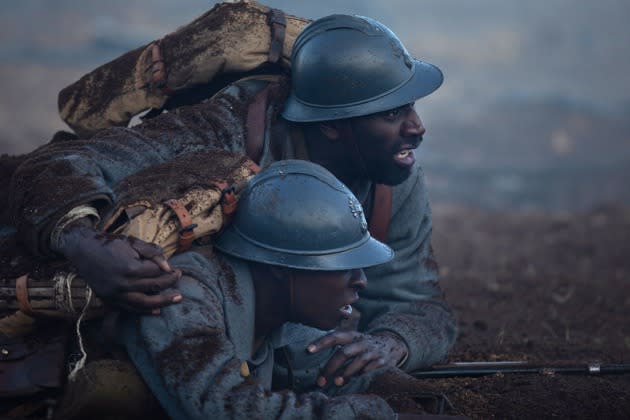‘Father and Soldier’ (‘Tirailleurs’): Film Review | Cannes 2022

The story of the Senegalese Tirailleurs — the regiments of colonized African soldiers who served the French army in numerous conflicts, including WWI and WWII — is a fascinating and troubling one, and yet it has seldom been told on screen.
DP turned filmmaker Mathieu Vadepied (The Intouchables) attempts to make up for that with his second feature, Father and Soldier (Tirailleurs), which stars Omar Sy as a man from Senegal who purposely enlists with the tirailleurs (which means “shooters” in French) during the First World War in order to protect his son, and then winds up fighting for both of their lives in the horrific Battle of Verdun.
More from The Hollywood Reporter
Jerzy Skolimowski's Cannes Jury Prize Winner 'EO' Heading to U.S. With Sideshow, Janus Films
'Will-o'-the-Wisp' ('Fogo-Fatuo'): Film Review | Cannes 2022
The premise is a bit outlandish and movie-ish, and yet it’s handled with aplomb by both director and star, who avoid some of the usual war flick clichés while plunging us into the unique, unseen world of the African troops. Opening up Cannes’ Un Certain Regard sidebar, the film could garner attention in France, where Sy is the biggest actor around right now, as well as abroad, where his Lupin series was a major hit on Netflix.
Co-written with Olivier Demangel (Cédric Jimenez’s November), the script takes some familiar routes but also some unfamiliar ones, leading us in an expected direction only to reverse course midway through. Initially, we follow the ordeal of Bakary Diallo (Sy), a father whose peaceful life as a herdsman in Senegal is upended after the French army raids his village to find recruits for the Great War. When his 17-year-old boy, Thierno (the expressive Alassane Diong), is scooped up, Bakary enlists in order to protect him, and soon enough the two are side-by-side in the trenches.
The film’s early sections immerse us in the lives of the tirailleurs, who often fought separately from white soldiers and were themselves a mix of men from all parts of West Africa and elsewhere. Much of the movie’s dialogue is in the Fula dialect, which Bakary and his son speak together — and which Sy, whose father is Senegalese, learned as a child — but other troops speak dialects like Wolof, creating a cacophony of languages that often leaves Bakary and Thierno in the dark as to how things work.
Vadepied did his research to render things as authentically as possible, with photography by Luis Arteaga (Tremors) keeping the colors as muted and muddy as the northern France settings, and production designer Katia Wsyzkop (Benedetta) recreating swathes of the trenches and a few villages torn apart by constant shelling.
Where the film falters is in a story that can sometimes feel as convoluted as a typical Hollywood action movie: How is it possible that Bakary keeps sticking by his son’s side, all the way into no man’s land and beyond, in an army that was highly policed and subject to strict discipline, with bombs bursting all around? In the scenario’s second half especially, the plotting outdoes many of the efforts at verisimilitude, and the portrait of the tirailleurs that Vadepied was trying to draw gets a bit tarnished.
But Father and Soldier also employs a few good twists, including a major one early on in which Thierno proves himself to be a hero during the movie’s biggest battle scene, dodging bullets and killing a few Germans across the firing line. His white superior, Lieutenant Chambreau (Jonas Bloquet), decides to name him corporal, putting the boy in a curious position: he’s now in charge of a squad that also includes his own dad. Meanwhile, Bakary keeps trying to get them out of there, teaming up with a fellow tirailleur, Salif (Bamar Kane), to scheme and steal his way to freedom.
It’s a welcome reversal, with the son usurping his father on the battlefield, testing his family ties but also ties to his homeland. There’s an underlying discourse in the film about two generations clashing during the war, with Bakary intent on returning to Senegal and picking up his work as a cow herder, while Thierno begins to see the possibilities of building a new life in France. Perhaps the most memorable scene is one in which Bakary listens in as the other soldiers talk about sleeping with white women, witnessing his son both growing up and distancing himself before his eyes.
Those more textured moments are stronger than some of the obvious notes the plot hits in the third act, with a foreseeable ending that nonetheless remains moving. Sy, who rose to stardom as a comic actor, has never been as dour and serious as he is here. He commits fully to a role in which, perhaps for the first time in his career, he hardly cracks a smile, and he winds up landing one of his best performances. It’s a grim turn indeed, but if feels fully justified in a film that doesn’t always convince dramatically, but maintains our interest in its attempt to tackle a part of French history that’s as long forgotten as all the fighters of this great and forgotten army.
Best of The Hollywood Reporter

